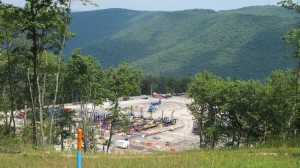DCNR investigating gas companies over royalty payments
-
Marie Cusick

Marie Cusick/ StateImpact Pennsylvania
The state agency is investigating “a couple” gas companies for shortchanging the state on royalties from drilling in public forests.
The Department of Conservation and Natural Resources is looking into whether some Marcellus Shale gas companies are shortchanging the state on royalty money.
The agency manages gas drilling on public forest land and currently has 117 active leases with about 18 different companies.
“We’re looking at the accuracy of payments,” says DCNR’s Chief Counsel, Richard Morrison. “It’s an internal process. It’s complicated and will take some time, but we’re proactively and aggressively pursuing those.”
Morrison declined to specify which companies are being investigated or say whether DCNR plans to file any lawsuits. He says the problems relate to only “a couple” of operators. Most of the issues involve companies withholding post-production costs from royalty payments. The agency brings in about $10 million per month in royalties.
Post production costs are the expenses involved in processing and moving natural gas from the well to the market and include things like dehydration, compression, and pipeline transport. Sometimes leases allow the gas company to share the expenses with a property owner. Other leases require the costs to be entirely borne by the driller.
For decades, Pennsylvania has required oil and gas companies to bear all post production expenses. Its leases prohibit companies from deducting the costs from the commonwealth’s royalty checks– yet that appears to be what’s happening.
These costs have recently become the subject of numerous lawsuits and complaints from landowners who allege some gas companies are charging them exorbitantly high fees–or ignoring lease terms– and effectively cheating them out of royalty money. Oklahoma City-based Chesapeake Energy has been at the center of many of those complaints.
Arianne Proctor is with DCNR’s minerals division and says the department has always carefully checked the information it receives from oil and gas companies drilling on public land. The agency has eight geologists on staff involved in verifying proper royalties and a contract with Penn State to audit gas volumes.
“There have been instances throughout the years where this has happened,” she says. “But more often than not, payments have been accurate and where there were issues the operator was very quick to make things right with the Commonwealth.”
Still, DCNR has recently ramped up its auditing efforts. Last year, it hired a new accountant to oversee royalty payments.
It’s also in the process of looking for a new external auditing firm to verify that gas pricing information is accurate– which will be a first for the agency.
“With unconventional development, the complexity of the arrangement between operators and their subsidiaries, as well as the people who market and transfer the gas, has grown tremendously,” says Proctor. “We just want to do our responsibility and verify the price is accurate.”
















